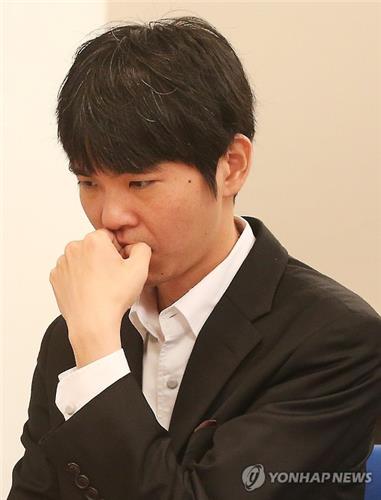- California Assembly OKs highest minimum wage in nation
- S. Korea unveils first graphic cigarette warnings
- US joins with South Korea, Japan in bid to deter North Korea
- LPGA golfer Chun In-gee finally back in action
- S. Korea won’t be top seed in final World Cup qualification round
- US men’s soccer misses 2nd straight Olympics
- US back on track in qualifying with 4-0 win over Guatemala
- High-intensity workout injuries spawn cottage industry
- CDC expands range of Zika mosquitoes into parts of Northeast
- Who knew? ‘The Walking Dead’ is helping families connect
Lee Se-dol to leave S. Korean pro Go players association

In this file photo taken on March 12, 2016, South Korean Go player Lee Se-dol (L) talks with Yang Gun (2nd R), the head of the S. Korean pro Go players’ association, after playing a Go match against Google’s artificial program AlphaGo in Seoul.
SEOUL, (Yonhap) — South Korean Go master Lee Se-dol, who is known for having faced Google’s artificial intelligence (AI) program AlphaGo in the ancient board game, has decided to withdraw from the local professional Go players’ association, apparently feeling uncomfortable about how much of a cut of his prize money they take.
It turns out that Lee, a ninth-dan player who turned pro at the age of 12, submitted a withdrawal letter to Yang Gun, the head of the S. Korean pro Go players’ association, on Tuesday, along with his older brother Lee Sang-hoon, who is also a ninth-dan player. Yang and the senior delegates had a meeting on Thursday and discussed the Lee brothers’ concerns for four hours.
This is the first time in South Korea that a pro Go player has decided to leave the association. All 320 pro Go players in South Korea are registered with the association that was established in 1967.
“In Lee’s withdrawl letter, his reason to leave the association was written quite simply,” Yang told reporters after the meeting. “We are going to have a conversation with Lee to find out details behind his decision.”
Yang said that the association has yet to decide whether it will approve Lee’s request. The president added that the association will conclude the case after talking with Lee and having additional executive meetings and a members’ congress.
“We haven’t set an appointment with Lee, but we are trying to meet him tommorrow after the Maxim Coffee Cup award ceremony where he will attend,” he said. “I hope he steps forward to have a conversation with us.”
Sources said that Lee is apparently fed up with the association’s requirement to receive a cut of its members’ prize money. The Go players are required to pay five percent of their prize money to the association when they compete in events sanctioned by the Korea Baduk Association (KBA).
If the local event only gives cash rewards to players who advance to certain rounds of a tournament, the association asks players to pay 15 percent of their earnings.
For competitions overseas, players must pay 3 percent of their earnings. The association said the money is used to support members’ welfare.
But the system means that top-class Go players like Lee have been giving much more money to the association than those with average performances in tournaments. Lee has won 48 titles in his career, including 18 international events. The 33-year-old reportedly wanted to implement a sliding percentage rate based on player performance. Yang said that the association can discuss the prize money issue as an offical agenda item during its congress or an executive meeting in the near future.
Under the articles of the association, a nonmember is prohibited from competing in KBA competitions. But the Lee brothers claim that there is no legally binding force to the association’s articles, saying that the association is just a “social club” for Go players.
The Lee brothers said that they could file a lawsuit if they are blocked from competing in KBA events.
“Since the tournament with AlphaGo, the Go community got a good opportunity to grow up, but we don’t want to ruin it with this issue,” said Yang. “We just hope for this matter to be concluded with a satisfactory result for both sides.”
Lee gained international fame when he entered the historic man-versus-machine showdown against Google AI AlphaGo in March. He lost 4-1 to the self-learning algorithm in a five-round Go tournament in Seoul.
Go, known as “baduk” in Korea, originated in China more than 2,500 years ago. It involves two players alternately placing black and white stones on a checkerboard-like grid of 19 lines by 19 lines. The object is to claim larger territories than one’s opponent by surrounding vacant areas of the board with one’s own stones.












